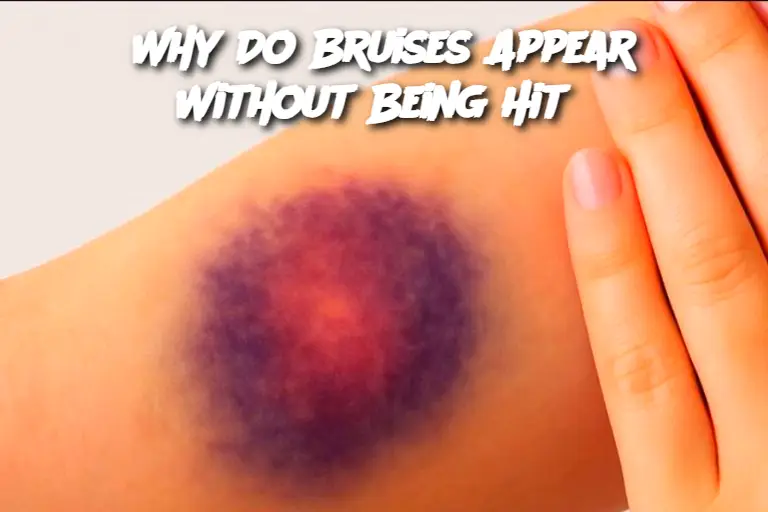ADVERTISEMENT
Introduction
Bruises are commonly associated with physical trauma like being hit or bumping into something. However, bruises can also develop without any direct injury to the skin. This phenomenon can be puzzling and might cause concern, especially if you notice unexplained bruises. Understanding why bruises appear without an impact involves exploring the underlying causes, including medical conditions, medications, and even genetic factors.
What Are Bruises?
A bruise, also known as a contusion, occurs when small blood vessels under the skin break, causing blood to leak into the surrounding tissues. This leads to the characteristic discoloration of the skin, which can change color over time as the body heals. While bruises typically result from physical trauma, sometimes they can appear without a clear external cause.
Possible Causes of Bruises Without Being Hit
Blood Clotting Disorders
Conditions like hemophilia, vitamin K deficiency, or platelet disorders can affect your blood's ability to clot properly. If the blood doesn't clot efficiently, even minor bumps or stresses that you don't notice might result in bruising. Additionally, some clotting disorders are inherited, which could explain bruising without any apparent injury.
Medications
Certain medications, such as blood thinners (e.g., aspirin, warfarin, and heparin), can make you more susceptible to bruising. These medications prevent blood from clotting normally, increasing the risk of internal bleeding and bruising, even from minor movements or pressure that may otherwise go unnoticed.
Aging
As we age, the skin becomes thinner, and the blood vessels beneath the surface become more fragile. This means that older adults might experience bruising more easily, even without a clear impact. The skin’s diminished elasticity also reduces its ability to protect blood vessels from breaking, which leads to bruising from even minimal stress.
Vitamin Deficiencies
Deficiencies in certain vitamins, particularly vitamin C (scurvy) and vitamin K, can cause blood vessels to become weaker and more prone to rupture. If you aren't getting enough of these vitamins from your diet, bruises can form more easily, even without any direct physical trauma.
Chronic Medical Conditions
Conditions such as diabetes, liver disease, or vasculitis (inflammation of blood vessels) can lead to increased bruising. For instance, liver disease can impair the production of clotting factors, which raises the likelihood of bruising without impact.
Fragile Skin
Some people naturally have more fragile skin due to genetic factors or specific conditions, such as Ehlers-Danlos syndrome. This can make them more prone to bruising without noticeable injury.
Autoimmune Disorders
Certain autoimmune conditions, such as lupus or rheumatoid arthritis, can result in bruising. These disorders might cause inflammation or issues with blood circulation, leading to increased bruising even without physical impact.
What To Do If You Notice Unexplained Bruising?
If you begin to notice bruises without any clear reason or if the bruises become larger, more frequent, or more painful, it's important to consult a healthcare provider. A doctor can perform a physical examination, review your medical history, and possibly run some tests (such as blood tests) to rule out any underlying conditions.
Conclusion
Bruises don't always require a hit or direct impact to form. Factors such as medication use, vitamin deficiencies, aging, and underlying medical conditions can make bruising more common, even without physical trauma. While occasional unexplained bruising may not be cause for concern, frequent or severe bruising warrants a medical evaluation to rule out more serious health issues.
Ingredients:
While not a typical recipe, understanding the factors contributing to bruising is key for addressing concerns. Think of your body’s health like a recipe, where the "ingredients" include:
Proper nutrition (vitamins C and K)
Adequate hydration
Regular exercise
Monitoring medication use
Preparation:
To minimize unexplained bruising:
Keep your skin moisturized to improve its elasticity.
Eat a balanced diet rich in essential vitamins and minerals.
Consult with a healthcare provider before starting or stopping medications, especially blood thinners.
Presentation and Storage Tips:
Bruises are naturally transient. Once formed, they typically fade with time. Applying ice within the first 24 hours can help reduce swelling and prevent further damage to blood vessels. Always seek medical advice if bruising is severe or if you notice an increase in frequency without clear cause.
Variation:
ADVERTISEMENT
